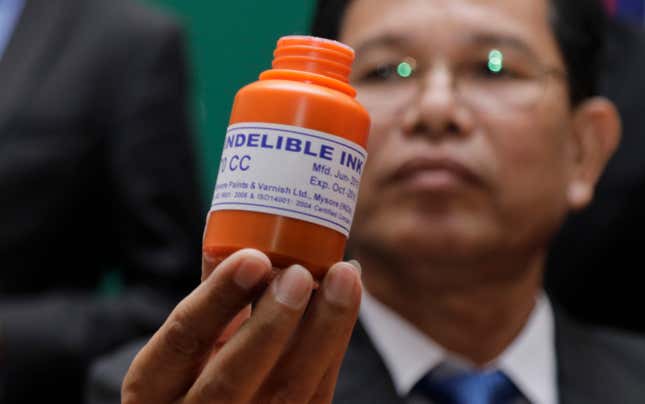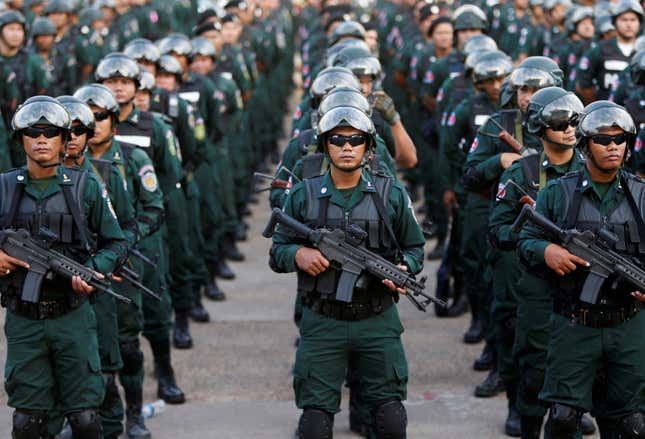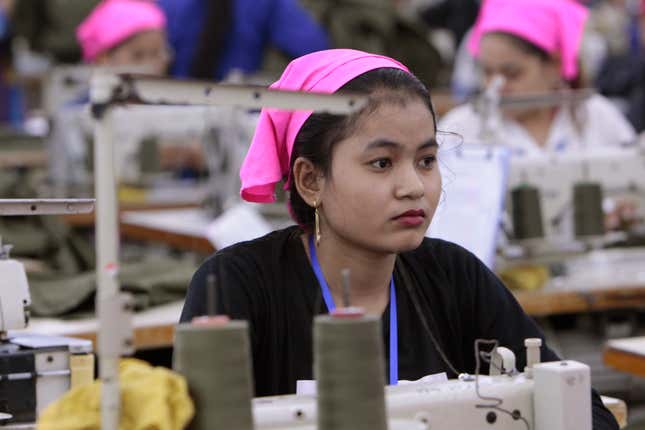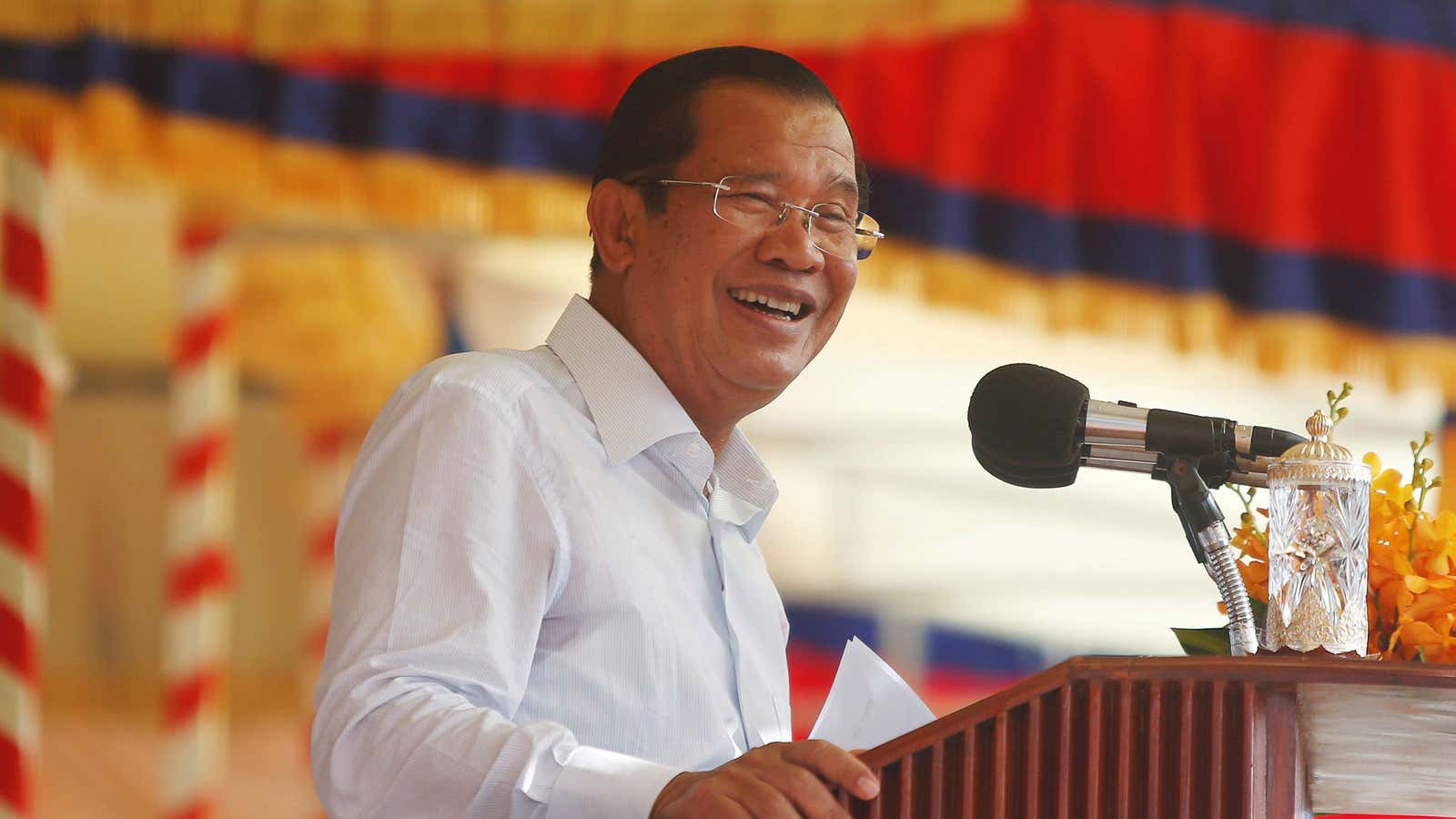Last month, Cambodian prime minister Hun Sen made made a strange demand ahead of his country’s general elections on July 29: Rival candidates, he said, must refrain from criticizing the ruling Cambodian People’s Party (CPP) he leads. To outsiders accustomed to politicians relentlessly attacking one another, such a demand is absurd. But so is much else about the contest, which Hun Sen will win, without a doubt.
In power for 33 years, Hun Sen is the world’s longest-serving prime minister. But he got a scare in the country’s last general elections in 2013. A strong showing by the main opposition, the Cambodia National Rescue Party (CNRP), suggested that it could overtake the CPP the next time around (indeed it contested the 2013 results). Another strong showing in last summer’s local elections reinforced the notion.
Alarmed, Hun Sen began cracking down on criticism, including from political rivals, the media, and civil society. Chief among the efforts was dissolving the CNRP last November, claiming it tried to overthrow the government with help from the United States. That act alone guaranteed the CPP’s election victory, as no other party in the race is capable of mounting a credible challenge.
Yet Hun Sen’s party does “respect” the democratic process in one sense: It needs to maintain at least the facade of free and fair elections so that it can claim some legitimacy, receive favorable economic treatment by Western powers, and stay compliant with a 1991 peace accord (pdf) that ended Cambodia’s civil war and mandates “periodic and genuine elections.”
Vote or else
With their party dissolved, CNRP leaders, many of whom fled abroad for fear of arrest, have urged Cambodians to boycott the vote in a “clean-finger campaign,” thus named because those who vote must dip their fingers in indelible ink.

A low-voter turnout would “significantly undermine the CPP’s claims to legitimacy, particularly since the CNRP will likely claim each vote not cast,” says Astrid Norén-Nilsson, who teaches Southeast Asian affairs at Lund University in Sweden and authored Cambodia’s Second Kingdom: Nation, Imagination, and Democracy. “If the voter turnout is high and the CPP wins convincingly, it will be easier for the CPP to defend its authoritarian turn by claiming popular support for it.”
Government officials have cautioned Cambodians against boycotting the vote. One warned in May that without the ink on their fingers, citizens would be easily identified as “guerrillas” and “traitors.” Authorities said this month that anyone who posts a picture of themselves online supporting a boycott with a “clean finger” would be fined between between $1,250 and $5,000. (In the garment industry, which generates $6 billion annually for the economy, the minimum wage is $170 a month.)
They soon made good on the threat. A recent Facebook photo showing 30 former CNRP members in Battambang province raising their index fingers drew the scrutiny of authorities. Days ahead of the election, some individuals involved were fined $2,500 each. ”People have the right to do what they want, but not raising fingers all together to incite [others not to vote as part of a] Clean Fingers campaign,” said a CPP official involved in the case.
Cambodians have also received warnings from their employers against not voting, according to CNRP deputy president Mu Sochua. ”Civil servants and factory workers are told to report back to work the next day with their fingers inked to show they have voted or they will be fired or see their earnings deducted,” she says.
Meanwhile the government has intimidated critics in other ways that belie its supposed support of fair elections. In speeches posted to his Facebook page, Hun Sen has threatened war if he ever loses power. Ahead of a summit in March in Sydney, Australia, he warned Cambodians there who were planning protests against him not to burn effigies of him: “I will follow you all the way to your doorstep and beat you right there… I can use violence against you.”
“I don’t think the CPP is happy about having to come out tough and intimidating,” notes Norén-Nilsson. ”The party has gradually been moving away from the violence that defined much of the 1990s to assume a more polished, democratic, and technocratic identity, designed to appeal to the emerging middle classes. The fright given by the CNRP has necessitated a return to a cruder discourse.”
Meanwhile the CPP has also tried to win over voters—not just intimidate them—with dubious methods. On campaign stops it’s handed out money to garment workers, who in 2013 largely supported the CNRP. Such payments violate electoral law, critics note.
With no one doubting the outcome, Sunday’s election has generated little excitement among Cambodians, in marked contrast to the 2013 contest, which featured large rallies for the CNRP.
“People in Cambodia realize that democracy is a farce anyway,” says Paul Chambers, a lecturer at the College of ASEAN Community Studies at Thailand’s Naresuan University. “Hun Sen and the CPP politically and militarily dominate Cambodia to such an extent that it is a waste of time to oppose the charade. Hence the lethargy.” The CPP controls the election commission, too, he adds.

Not to mention, people are simply afraid, says Mu Sochua, noting that armed forces are often seen practicing anti-riot exercises while heavily armed.
The world reacts
The slide toward dictatorship has not gone unnoticed by other countries and international organizations, including the 10-country Association of Southeast Asian Nations (ASEAN), of which Cambodia is a member. In April, the ASEAN Parliamentarians for Human Rights called for a conference to “reverse course in Cambodia,” noting that “far-reaching remedial steps would be required for this election to be deemed genuine, participatory and inclusive.”
Last month the National Council of Churches of Korea awarded its Asian Human Rights Peace Prize to CNRP leader Kem Sokha for his efforts to promote human rights and democracy in Cambodia. Mu Sochua and a fellow opposition leader received the award on Sokha’s behalf. Authorities had arrested Sokha in his Phnom Penh home last September on treason charges, and he remains in pre-trial detention.
This week, the US House of Representatives passed the Cambodia Democracy Act, which would allow for the imposition of stiff financial sanctions on Hun Sen, his family members, and senior officials responsible for undermining democracy. Last month, the Treasury Department sanctioned Hing Bun Heang, the chief of Hun Sen’s bodyguard unit, for alleged human rights abuses.
The European Union, which accounts for 40% of Cambodia’s overall exports, has warned that it might expel Cambodia from the Everything But Arms (EBA) trade scheme that lets economically vulnerable nations export nearly all products into the EU free of quotas and tariffs. Earlier this month an EU delegation visited the country for a “closer assessment of whether Cambodia is fulfilling its commitments” amid a “decline in the area of political and electoral rights.”

But the EU won’t likely kick Cambodia out of the trading scheme, according to the Garment Manufacturers Association in Cambodia, because doing so would hurt ordinary people. The move would be a measure of last resort, said EU trade commissioner Cecilia Malmström.
Still, Phil Robertson, deputy director of Human Rights Watch’s Asia division, believes “Hun Sen knows one language only, that of international pressure.” Considering the EBA scheme requires a recipient nation to respect international human rights, he argues the EU should ”expand its critical investigation and demands to Cambodia to comply or face the consequences.”
Whether such consequences would hurt the CPP enough is in doubt, and China is a big reason why. In recent years Beijing has showered Hun Sen’s government with hefty development loans and military assistance, while making no pesky demands about democratic reforms or human rights. Hun Sen’s government in return has bent rules and made generous land concessions for Chinese companies, stoking resentment among ordinary Cambodians. It’s also served as Beijing’s proxy within ASEAN, blocking the organization from making statements that criticize China’s expansive territorial claims in the South China Sea.
“Hun Sen has basically sold out his country in exchange for Chinese support for his regime,” says Chambers. “Cambodia has become a country for sale to the Chinese, and the Chinese have entrenched Cambodia’s dependency under Beijing… China has succeeded in commodifying the sovereignty of Cambodia.”
If the EU did remove Cambodia from the EBA scheme, Hun Sen would have China’s response to worry about, suggests Robertson. The action would “strip the benefit from Cambodia, causing consternation with the primarily Chinese garment factory owners who will then complain to China that Hun Sen has misplayed the situation and needs to be put in line by Beijing.”
Mind the legacy
Hun Sen has another reason to keep up the facade of free and fair elections: his self-image.
“Hun Sen aims to secure as much legitimacy as he can garner as a so-called ‘democratic leader’ arising from the election,” says Robertson. “This is important to his status and self-image, and to deflecting additional international pressure on him to rein in his rights abuses.”
The prime minister in recent years has sought to identify himself with Sdech Kan, an otherwise minor figure in Cambodia’s history. According to the legend, Kan started in the servant class but rose to become king after raising an army and overthrowing an unjust ruler. Hun Sen, too, rose to the top from humble origins.
In recent years the CPP-aligned business elite has funded the erection of Sdech Kan statues across the country, with many bearing a striking resemblance to Hun Sen. Last summer, a big-budget film, by Cambodian standards, celebrating Sdech Kan was released, with a member of Hun Sen’s government directing it.
“I do imagine that Hun Sen considers himself a reincarnation of Sdech Kan, destined to lead the nation through prowess and might,” Norén-Nilsson told the New York Times last December (paywall).
Though he plans to stay in power for another decade, Hun Sen is also grooming his sons so that one of them can eventually take over the country. The eldest, Hun Manet, recently became a four-star general in the Royal Cambodian Armed Forces.
Hun Sen “fears the loss of control and erasure of his legacy,” says Ear Sophal, who’s authored books on Cambodia and China and teaches world affairs at Occidental College in Los Angeles. ”He’s made a Faustian pact to keep his family and his party in control of domestic politics in Cambodia forever. The foreign policy he’s outsourced to China… His biggest fear is that he and his people—increasingly his own family—will lose power, and it will mean very harsh consequences for all of them.”
Hun Sen also clearly craves adulation. In 2016 his information ministry instructed journalists to start using a six-word title—Lord Prime Minister and Supreme Military Commander—upon first reference to the prime minister, threatening legal action against those who don’t comply.
Authorities would not take kindly to any suggestion the people are not behind the Lord Prime Minister and Supreme Military Commander. That’s all the more reason for them to “respect” the election process—by ensuring it’s entirely predictable.




